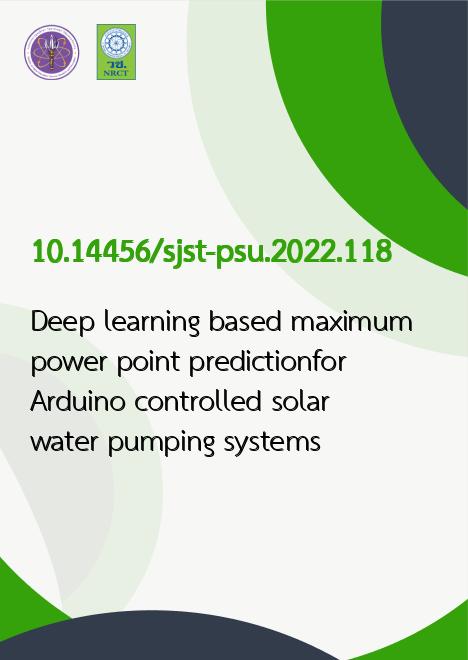
|
Deep learning based maximum power point predictionfor Arduino controlled solar water pumping systems |
|---|---|
| รหัสดีโอไอ | |
| Creator | 1. K. Punitha 2. V. Seetharaman 3. D. Devaraj 4. V. Selvaganesh |
| Title | Deep learning based maximum power point predictionfor Arduino controlled solar water pumping systems |
| Publisher | Research and Development Office, Prince of Songkla University |
| Publication Year | 2565 |
| Journal Title | Songklanakarin Journal of Science an Technology (SJST) |
| Journal Vol. | 44 |
| Journal No. | 3 |
| Page no. | 884-891 |
| Keyword | deep learning, LSTM network, prediction, incremental conductance MPPT, Proteus, python, Arduino UNO |
| URL Website | https://rdo.psu.ac.th/sjst/index.php |
| ISSN | 0125-3395 |
| Abstract | Solar water pumps are bringing environmental and socio-economic benefits for remote areas where agriculture plays avital role in the livelihoods of people. Maximum power point tracking (MPPT) solar charge controller known as smart DC-DCconverter is necessary for all solar photovoltaic (PV) power system to extract maximum available power from PV module MPPTcontroller forces PV module to operate at voltage close to a maximum power point which improves the efficiency of the solar PVsystem. The prior knowledge of MPP is necessary to start any conventional MPP algorithm. As the MPPT algorithms have noprior knowledge of the MPP at the start of the perturbation, these algorithms take a long time to reach the MPP. In this work, adeep learning-based long short term memory (LSTM) network is used to provide the prior knowledge on MPP which minimizesthe tracking time and maximizes the efficiency of the PV system. The cascaded buck-boost converter is utilized to minimize theinput and output side ripples. The dataset needed to train the LSTM is collected from a 33 kWp PV plant installed in PSREngineering College, India. The PV system along with an Arduino UNO based MPP controller is simulated using Proteussoftware. The proposed algorithm is found to be far better by its statistical analysis and also this initial value makes the MPPalgorithm superior in both accuracy and response, i.e., 0.05 seconds prior. To validate the proposed algorithm hardware prototypewith proportional parameters is developed. |
